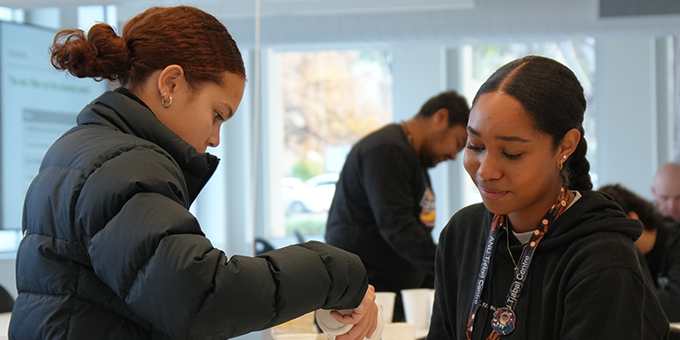“At my school, university is seen to be this very independent thing. But coming here made it feel like a lot more of an intimate experience, especially with Tjabal. It reaffirms in my head that uni isn’t as intimidating as it’s made out to seem.”
This Winter, Indigenous high school students from around the country gathered in our bushland capital to visit The Australian National University (ANU), discover the possibilities of engineering as a discipline, and experience university life.
The inaugural National Indigenous Engineering Winter School was held from 2-6 July thanks to the ANU School of Engineering and its Bandalang Studio, the ANU Tjabal Indigenous Higher Education Centre, and generous support from the Commonwealth Bank of Australia.
The mid-year initiative builds upon the foundations of the National Indigenous Summer School, with a focus on innovation, discovery, and the contributions of Indigenous technical, cultural, ecological and scientific knowledge. These traditions are ongoing and critical to finding new technological and systems engineering solutions for our future.
“We are very excited to welcome students to the ANU this winter, to explore the discipline of engineering via our particular focus of systems engineering,” said Professor Chris Kellett, Director of the School of Engineering.
“We’ve designed a program that reflects the diversity of our interdisciplinary approach to education and research, that spans traditional disciplinary boundaries in areas such as renewable energy, the hydrogen economy, materials, robotics, mechatronics, and information and signal processing; redefining the art of the possible in aerospace, energy, environmental, and autonomous systems.”
The first 2023 cohort brought together nine students from Years 11 and 12 across Australia to take part in sessions offering insights into the field of engineering and university study.
The three-day program included many highlights that reflect our interdisciplinary approach to engineering at ANU, with activities facilitated by the ANU MakerSpace and Engineers Without Borders. Students participated in a water sanitisation workshop, where mock teams purchased tools to clean water as best as they could with their prescribed budget. A light up badge soldering activity introduced the group to electrical hands-on making practice. A challenge to construct small solar cars propelled by fans. And a rocket simulation with the popular game ‘Kerbal Space Program’ allowed them to simulate both rocket building and launches with comic novelty.
“I was expecting a lot more theory, so on the first day I was pleasantly surprised to be doing a soldering activity. That really sparked my interest,” said Lemarna, a Kubbi Kubbi and Gorreng Gorreng woman, from Guildford Grammar School in WA. “In each session I found a lot of the stuff I was learning to be super applicable.”
On Wednesday night, the group travelled to Mt Stromlo Observatory where they were treated to a tour of the facility to see where instruments for the Giant Magellan Telescope are in production, a 250kg meteorite, and ANU Vice-Chancellor Professor Brian Schmidt’s Nobel Prize.
 The Winter School featured many Indigenous friends and supporters of the University, including Dr Cat Kuday and Matthew Heffernan who shared their experiences of applying Indigenous knowledge systems in engineering, and led a discussion around Indigenous perspectives.
The Winter School featured many Indigenous friends and supporters of the University, including Dr Cat Kuday and Matthew Heffernan who shared their experiences of applying Indigenous knowledge systems in engineering, and led a discussion around Indigenous perspectives.
Visiting students also had plenty of free time to explore our beautiful campus on the lands of the Ngunnawal and Ngambri people, before returning to their respective homes.
The program wrapped with a yarning circle initiated by the Tjabal Centre for open dialogue and sharing.
“I don’t know what I was expecting. It wasn’t this, but this was a lot better! I thought it was going to be a lot of talking and lecture-like things where they’re telling us what they do. So the hands-on stuff was really cool,” said Noah, a Noongar man from Guildford Grammer School in WA.
The group reflected at length about their expectations and how the high schoolers might set themselves up if they choose to pursue university study in the future.
One attendee commented: “At my school, university is seen to be this very independent thing. But coming here made it feel like a lot more of an intimate experience, especially with Tjabal. It reaffirms in my head that uni isn’t as intimidating as it’s made out to seem. I feel more motivated to try and do well this year.”
“It’s good to know I can go back to my communities and show that there’s better opportunities to go to university,” said Josh, a Waka Waka and Kubi Kubi man from Hymba Yumba Independant School in Queensland, when asked what message the program had left with them.
 Since this is the inaugural cohort of students, we’re excited to walk this new path together and would like to thank our 2023 Winter School participants for trusting us on this journey.
Since this is the inaugural cohort of students, we’re excited to walk this new path together and would like to thank our 2023 Winter School participants for trusting us on this journey.
“It’s not in our mob’s tradition to go to university. You are pioneers. Remember, this is a pilot project, and you are the first of the first to do this, so we need you to go back and share with your fellow students and your family,” said Marcia Mitchell from the ANU Tjabal Centre.
At the end of the discussion, we were honoured to see the group identify that university can open doors, providing a pathway to additional growth and career options, and that higher education is something that is not culture-bound but accessible to all.
Thank you to everyone involved for joining us in leading a new generation of engineers.

